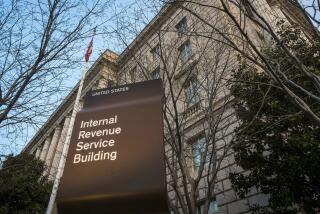Ensuring a System’s Integrity : IRS’ internal probe leads to some unhappy returns
- Share via
Returns filed by taxpayers with the Internal Revenue Service must by law be guarded from unauthorized scrutiny. The President can’t demand access to anyone’s tax return. Neither can Congress. The doctor-patient relationship secures the privacy of personal medical records; the relationship between taxpayer and tax collector is supposed to be similarly guaranteed, not just against snooping by outsiders but--of vital importance--against the unwarranted prying of IRS employees. Unhappily, the process isn’t foolproof.
“Integrity reviews” conducted by the IRS itself have uncovered numerous abuses by its employees. A probe of the Southeast Region, headquartered in Atlanta, cast suspicion on 369 workers. Two have been indicted. At least one employee is reported to have altered accounts in a scheme to get kickbacks from bogus refund checks. Apparently more common has been the practice of some employees of “browsing” through returns for “no clear business purpose,” as an internal report on the IRS’ three-year-long investigation says. Here the motivation seems to be just plain nosiness.
Tax returns of celebrities have been looked at, as well as the files of friends and neighbors. Did what was learned from such peeks go no further than the employees who did the peeking? It defies common sense to suppose so. The temptation to relate to others what prominent persons really earned--or at least reported to the IRS--must have been overwhelming.
The IRS says that as a result of its study there have been changes to make it easier for managers to monitor employees who have access to computer files. Today Margaret Richardson, the new head of the IRS, is scheduled to appear before the Senate Governmental Affairs Committee. A key question is whether the new safeguards are adequate to assure the system’s integrity. This is not a minor point. IRS files represent perhaps the most intimate connection between citizen and government. The issue is trust. Public confidence in the IRS demands that laws on confidentiality be scrupulously followed.
More to Read
Get the L.A. Times Politics newsletter
Deeply reported insights into legislation, politics and policy from Sacramento, Washington and beyond. In your inbox twice per week.
You may occasionally receive promotional content from the Los Angeles Times.









